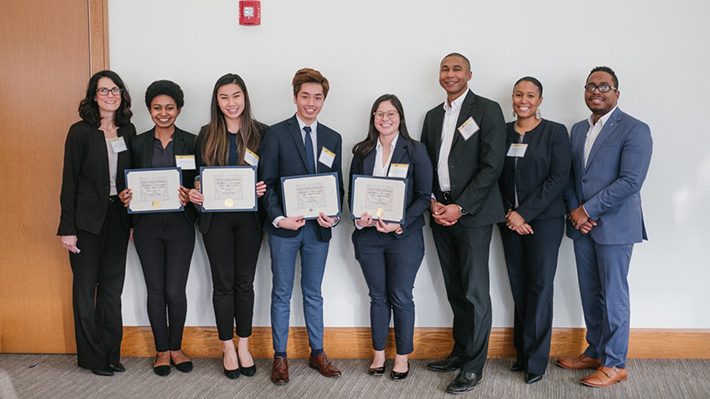The Muddled World of Leadership Cliches, and More – Philadelphia News

As November draws to a close, let’s take a look at some of the biggest business school stories coming out of Philadelphia business schools this week.
Three Big Leadership Clichés – and How to Rethink Them – LinkedIn
Geoffrey Garrett, Dean of The Wharton School and official LinkedIn “Influencer,” recently took to the social media site to talk about the gamut of leadership cliches that dominate the conversation around those roles.
In a conversation with a group of upper-level executives at the Wharton CEO Academy in New York, Garrett pivoted away from the following three cliches, turning them into something more modern, useful, and promising:
1.) Stick to your guns
2.) Question everything
3.) It’s a marathon, not a sprint
On sticking to one’s guns, Garrett emphasizes certain elements of 1980s corporate and political culture that found esteeming value when a leader does not waver on their principles. “Sticking to your guns is valued because it signals strength, courage and commitment under adversity, which is why we so often think about war heroes in this way,” he says.
He notes, however, that there is value in knowing when to “fold ’em” with a key Kenny Rogers reference in tow. “There is no simple score sheet to tell you when the positives from sticking to your guns become outweighed by the negatives. But the world is littered with examples where leaders wait too long to make the switch. Think General Lee’s historic defeat at Gettysburg in the American Civil War, Jeff Immelt at GE or John Chambers at Cisco,” Garrett continues.
“Most leaders will change course eventually because there is not much valor in heroic defeats. But the best leaders will change course long before the writing is on the wall. Compare the demise of Kodak with the transformation of IBM. But how do you know when the writing is on the wall? The answer is judgment, arguably the most valuable trait in a leader. It’s easy to recognize in hindsight, because good leaders make good decisions—the definition of good judgment.”
To see the rest of Garrett’s advice on leadership cliches, head over to LinkedIn.
Drexel Students Win Second Annual Diversity Case Competition – Drexel LeBow News
Students from the Drexel University LeBow College of Business brought home a brand new title as winners of the second annual Diversity and Inclusion Business Case Competition.
Drexel LeBow defeated 11 other local challenging universities in a competition with a goal to “help create a diversity training protocol for Home Away From Home, a global hotel chain,” according to the business school.

Winners from the LeBow College of Business at the second annual Diversity and Inclusion Business Case Competition / Photo via lebow.drexel.edu
The LeBow team of “Johnny Zhu, Kimberly Gain, Stephanie Arredondo, and Rachael Wright” nabbed first place with their curiously-titled “Raising Our One Family (ROOF)” strategy. Zhu explains, “ROOF stands for the overall company-wide training, which is rolled out in the form of top-down management and tailored to individual locations, corporate level, and field level. This proposal is not a mold, but a 360-integrated training approach where as a family, employees are living out the mindset of diversity and inclusion, not only to guests but to each other as well.”
To learn more about the Drexel LeBow team and the case competition, click here.
The Bizarre Bias That Affects How You Shop – BBC
The work of Beth Vallen, a researcher at the Villanova School of Business, was recently highlighted by author Martha Henriques in the BBC regarding just how pervasive “anti-fat” bias can be.
Henriques notes that overweight people tend to statistically suffer when it comes to things like job offerings, and even get less eye-contact than people of average weight and size. It is perhaps not so surprising to find that business models are often altered for overweight people.
In “Shape and Trait‐Congruency: Using Appearance‐based Cues as a Basis for Product Recommendations,” a new study authored by Vallen and colleagues Karthik Sridhar, Dan Rubin, Veronika Ilyuk, Lauren G. Block, and Jennifer J. Argo—published in the Journal of Consumer Psychology—found that overweight customers were offered more products that resembled their body types, even if the products, such as bottles of perfume, were not wearable.
Speaking with Henriques, Vallen says, “Our thinking was these subtle prejudices that lead to these effects are based on something more than superficial shape-matching.”
“We wanted to show that this was a bias that reflects the thoughts and decisions processes of all people, not just sales people.”
To read more about the study, head over to the BBC website and the Journal of Consumer Psychology.
Forced Good Behavior Isn’t Good, According to Columbia – New York News

Let’s explore some of the most interesting stories that have emerged from New York City business schools this week.
Columbia Business School: Mandated Corporate Good Behavior Hurts Bottom Line & Reduces Efforts to “Do Good” – CBS Newsroom
New research from Columbia Business School professor Shivaram Rajgopal finds that mandatory Corporate Social Responsibility as a business practice is a “value-decreasing proposition for shareholders, and a disincentive for corporate good behavior.”
Raigopal writes, “Our findings prove that CSR is counterproductive when governments get involved. In developing an effective method for measuring CSR’s impact on business we were able to prove that CSR only has value if it is a voluntary activity. Shareholder value decreases as mandatory CSR increases. In fact, mandatory CSR is, in effect, nothing more than an inefficient backdoor tax on private sector.”
You can read more about Raigopal’s research here.
Introduction of Craigslist Increased Prostitution Across U.S. – Experience Stern
New research from NYU Stern School of Business and the University of Minnesota’s Carlson School of Management finds that “as Craigslist expanded across the United States, the free classifieds website also bolstered the sex industry,” which co-author Anindya Ghose, the Heinz Riehl Professor of Business at the Stern School, explains is “made up of both independent sex workers and workers operating under commercial vice groups.” In fact, Craigslist’s entry into a county increased prostitution cases—both “transactions by existing sex workers, as well as prompted recruitment and coercion of new ones”—by 17.58 percent.
The data was revealed in the recently-released study “The Digital Sin City: An Empirical Study of Craigslist’s Impact on Prostitution Trends”, which was “based on analysis of national panel data for 1,796 U.S. counties from 1999 to 2008.”
You can read more about the study here.
Lonely and Non-Empathetic People More Likely to Make Unethical Shopping Decisions – Binghamton SOM
New research from Binghamton SOM assistant professor of marketing Jenny Jiao finds that lonely consumers “very often behave immorally. And while these behaviors are often legal, they are unethical and cost retailers billions each year.”
She cites the common example of ‘wardrobing’ in which “someone may buy a big-screen TV for Super Bowl Sunday, only to return it on Monday; or they may buy a nice outfit for a night out, only to return it the next day.”
In Jiao’s paper, “Can Lonely People Behave Morally? The Joint Influence of Loneliness and Empathy on Moral Identity,” which was recently published in the Journal of Consumer Psychology, she was interested in how much of a factor loneliness played in this type of consumer behavior.
“We found that lonely people are capable of empathizing and making moral decisions, but they may not have the intention or motivation to. But when empathy levels increase, we don’t see much difference between lonely people and non-lonely people. Lonely people will be more likely to engage in moral behaviors and less likely to engage in immoral behaviors when they feel empathy.”
Read more about Jiao’s research here.
New Dean Announced at UC Davis GSM

The UC Davis Graduate School of Management (UC Davis GSM) proudly announced the appointment of its new dean, H. Rao Unnava, on June 15, 2016.
“We are pleased to announce the appointment of H. Rao Unnava… effective June 22, 2016” said Acting Chancellor Ralph Hexter and Acting Provost/Executive Vice Chancellor Kenneth Burtis in a statement.
